DATSUN B110 1973 Service Repair Manual
Manufacturer: DATSUN, Model Year: 1973, Model line: B110, Model: DATSUN B110 1973Pages: 513, PDF Size: 28.74 MB
Page 101 of 513
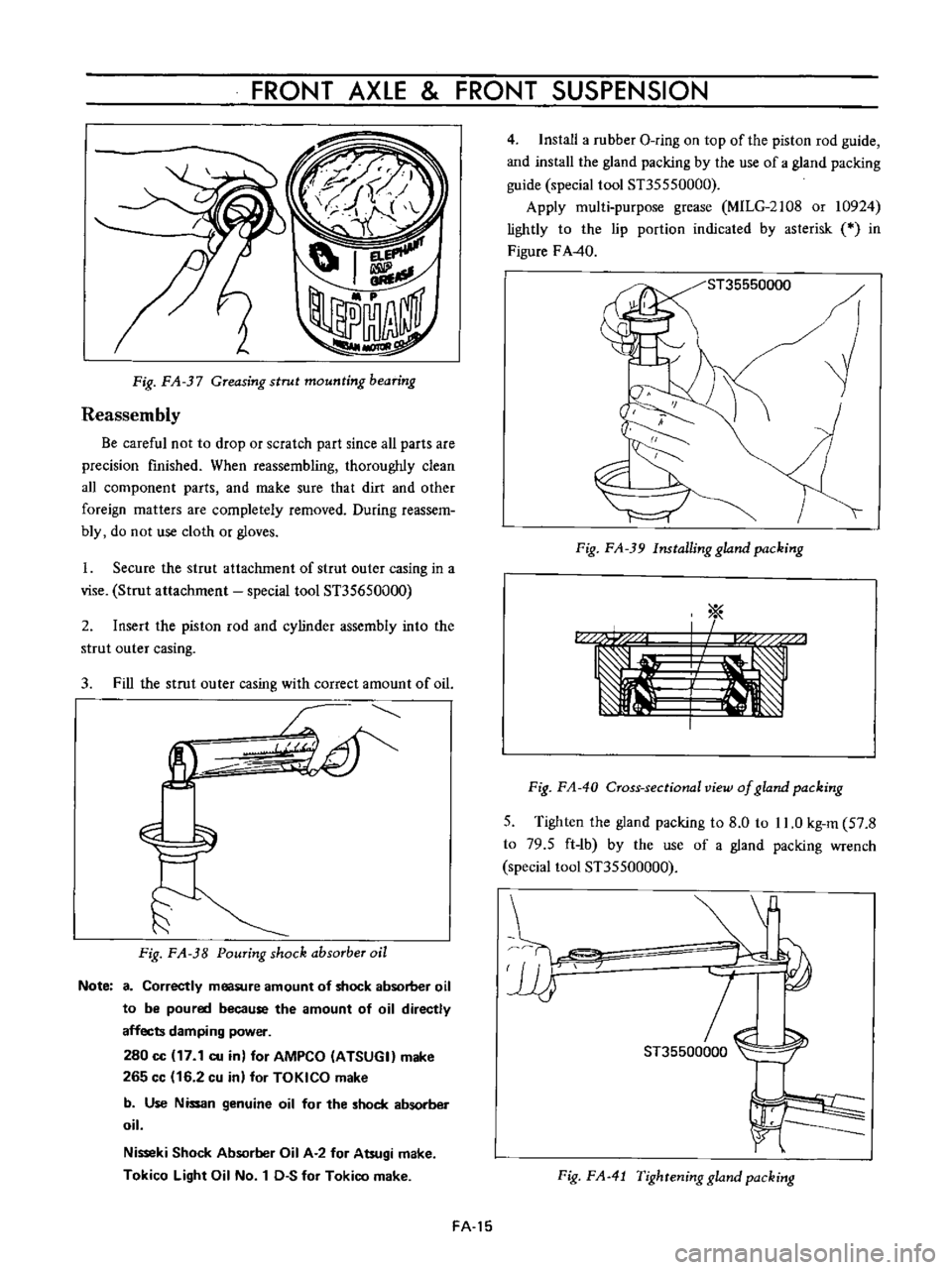
FRONT
AXLE
FRONT
SUSPENSION
I
f
f
ij
Reassembly
Fig
FA
37
Greasing
strut
mounting
bearing
Be
careful
not
to
drop
or
scratch
part
since
all
parts
are
precision
finished
When
reassembling
thoroughly
clean
all
component
parts
and
make
sure
that
dirt
and
other
foreign
matters
are
completely
removed
During
reassem
bly
do
not
use
cloth
or
gloves
I
Secure
the
strut
attachment
of
strut
Quter
casing
in
a
vise
Strut
attachment
special
tool
ST35650000
2
Insert
the
piston
rod
and
cylinder
assembly
into
the
strut
outer
casing
3
Fill
the
strut
outer
casing
with
correct
amount
of
oil
1
Fig
FA
38
Pouring
shock
absorber
oil
Note
a
Correctly
measure
amount
of
shock
absorber
oil
to
be
poured
because
the
amount
of
oil
directly
affects
damping
power
280
cc
17
1
cu
in
for
AMPCO
ATSUGI
make
265
cc
16
2
cu
in
for
TOKICO
make
b
Use
Nissan
genuine
oil
for
the
shock
absorber
oil
Nisseki
Shock
Absorber
Oil
A
2
for
Atsugi
make
Tokico
light
Oil
No
1
D
S
for
Tokico
make
FA
15
4
Install
a
rubber
O
ring
on
top
of
the
piston
rod
guide
and
install
the
gland
packing
by
the
use
of
a
gland
packing
guide
special
tool
ST35550000
Apply
multi
purpose
grease
MILG
2108
or
10924
lightly
to
the
lip
portion
indicated
by
asterisk
0
in
Figure
F
A40
ST35550000
1
Fig
FA
39
Installing
gland
packing
a
1
c
I
Fig
FA
40
Cross
sectional
view
of
gland
packing
5
Tighten
the
gland
packing
to
8
0
to
11
0
kg
m
57
8
to
79
5
ft
1b
by
the
use
of
a
gland
packing
wrench
special
tool
ST35500000
ST35500000
Fig
FA
41
Tighrening
gland
packing
Page 102 of 513
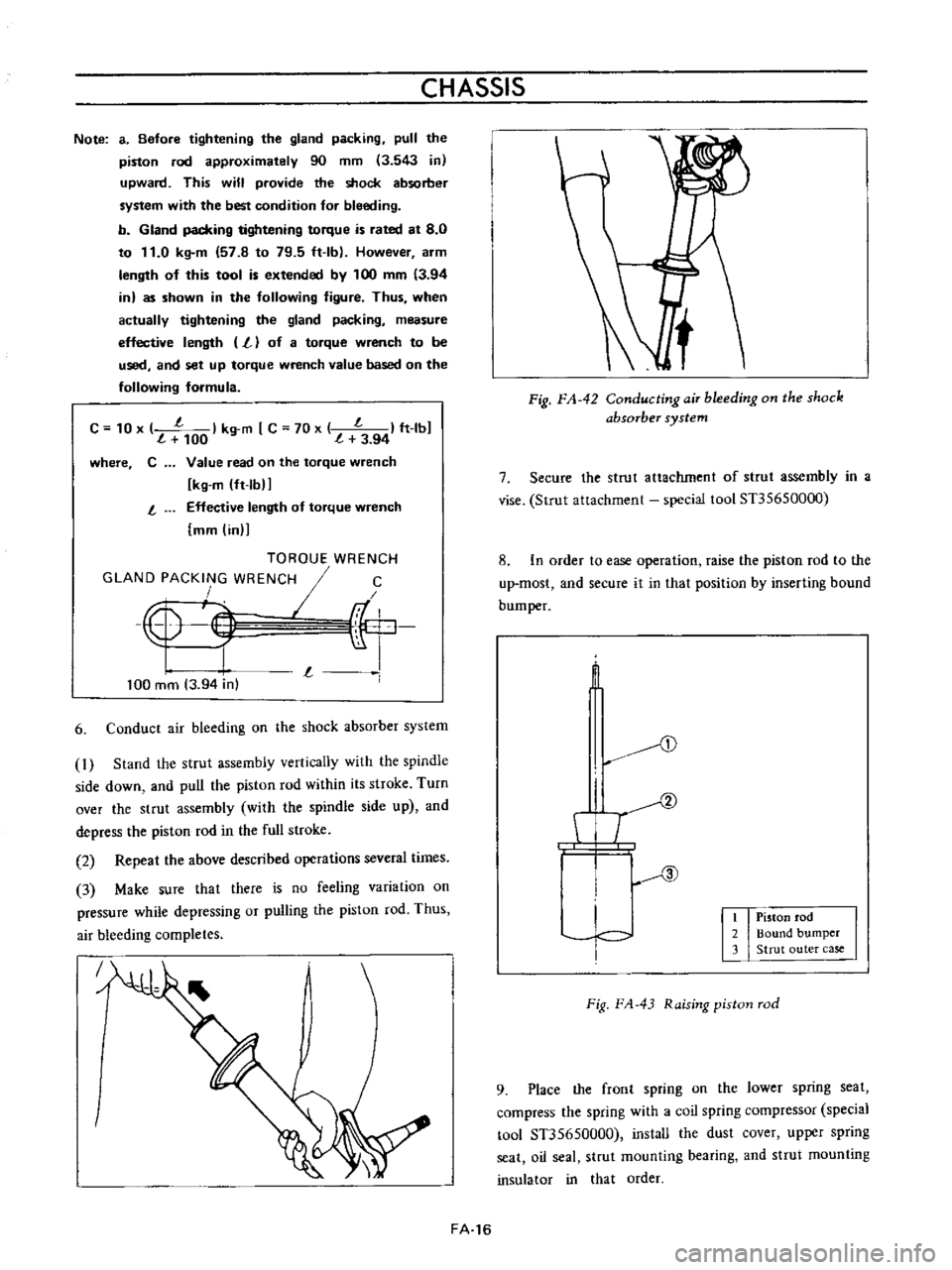
CHASSIS
Note
a
Before
tightening
the
gland
packing
pull
the
piston
rod
approximately
90
mm
3
543
in
upward
This
will
provide
the
shock
absorber
system
with
the
best
condition
for
bleeding
b
Gland
packing
tightening
torque
is
rated
at
8
0
to
11
0
kg
m
57
8
to
79
5
ft
Ib
However
arm
length
of
this
tool
is
extended
by
100
mm
3
94
in
as
shown
in
the
following
figure
Thus
when
actually
tightening
the
gland
packing
measure
effective
length
L
of
a
torque
wrench
to
be
used
and
set
up
torque
wrench
value
based
on
the
following
formula
C
10
x
l
I
kg
m
C
70
x
l
I
ft
lbJ
100
l
3
94
where
C
Value
read
on
the
torque
wrench
kg
m
ft
lbIJ
Effective
length
of
torque
wrench
mm
in
l
TOROUE
WRENCH
GLAND
PACKING
WRENCH
I
C
4
F
r
I
L
I
100
mm
3
94
in
6
Conduct
air
bleeding
on
the
shock
absorber
system
1
Stand
the
strut
assembly
vertically
with
the
spindle
side
down
and
pull
the
piston
rod
within
its
stroke
Turn
over
the
strut
assembly
with
the
spindle
side
up
and
depress
the
piston
rod
in
the
full
stroke
2
Repeat
the
above
described
operations
several
times
3
Make
sure
that
there
is
no
feeling
variation
on
pressure
while
depressing
or
pulling
the
piston
rod
Thus
air
bleeding
completes
J
FA
16
Fig
FA
42
ConductingaiT
bleeding
on
the
shock
absorber
system
7
Secure
the
strut
attachment
of
strut
assembly
in
a
vise
Strut
attachment
special
tool
Sn5650000
8
In
order
to
ease
operation
raise
the
piston
rod
to
the
up
most
and
secure
it
in
that
position
by
inserting
bound
bum
per
t
D
I
T
I
c
I
Piston
rod
2
Bound
bumper
3
Strut
outer
case
Fig
FA
43
Raising
piston
rod
9
Place
the
front
spring
on
the
lower
spring
seat
compress
the
spring
with
a
coil
spring
compressor
special
tool
Sn5650000
install
the
dust
cover
upper
spring
seat
oil
seal
strut
mounting
bearing
and
strut
mounting
insulator
in
that
order
Page 103 of 513
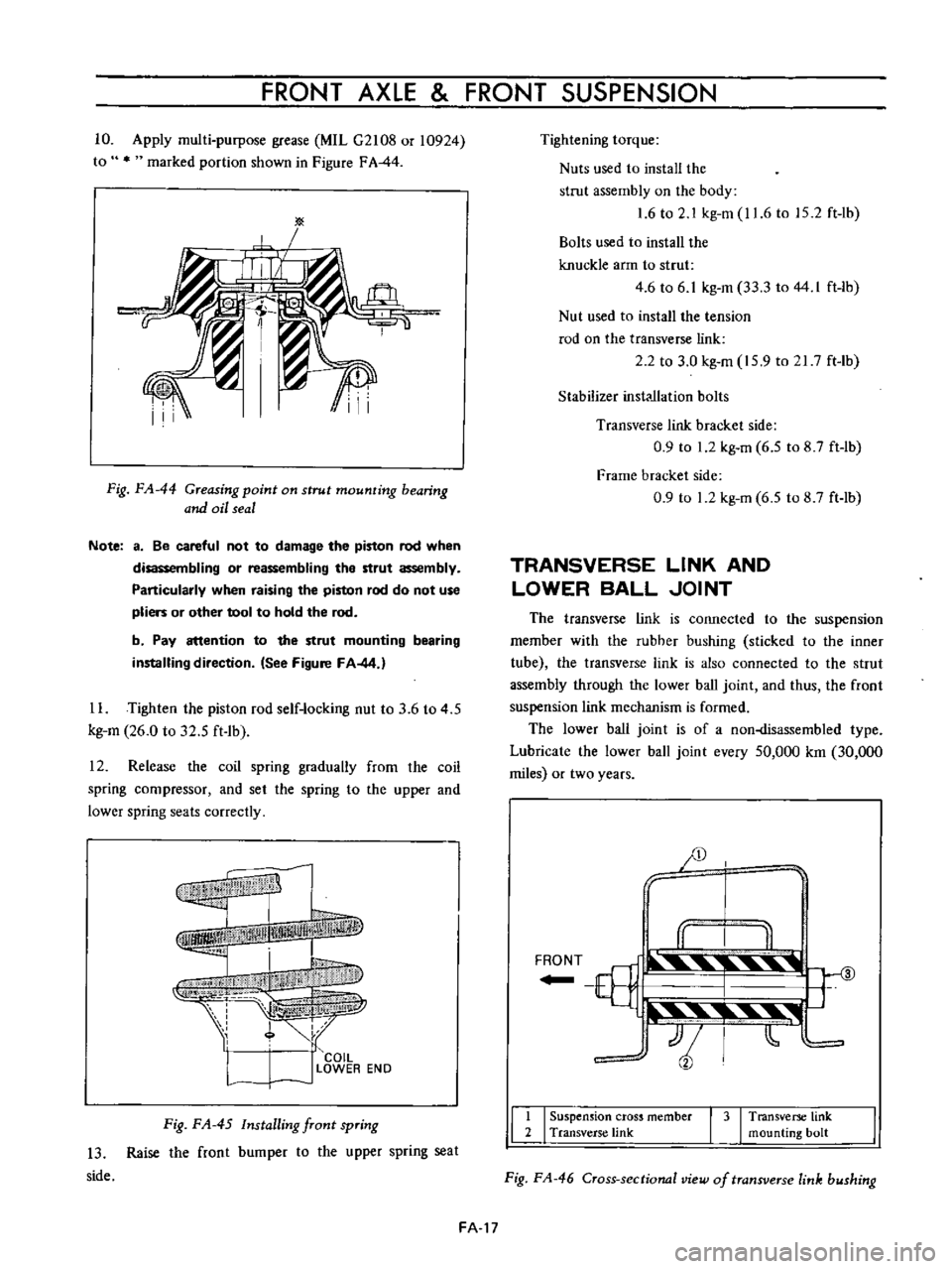
FRONT
AXLE
FRONT
SUSPENSION
10
Apply
multi
purpose
grease
MIL
G2108
or
10924
to
marked
portion
shown
in
Figure
FA
44
Fig
FA
44
Greasing
point
on
strut
mounting
bearing
and
oil
seal
Note
a
Be
careful
not
to
damage
the
piston
rod
when
disassembling
or
reassembling
the
strut
assembly
Particularly
when
raising
the
piston
rod
do
not
use
pliers
or
other
tool
to
hold
the
rod
b
Pay
attention
to
the
strut
mounting
bearing
installing
direction
See
Figure
FA
44
1
L
Tighten
the
piston
rod
self
locking
nut
to
3
6
to
4
5
kg
m
26
0
to
32
5
ft
1b
12
Release
the
coil
spring
gradually
from
lhe
coil
spring
compressor
and
set
the
spring
to
the
upper
and
lower
spring
seats
correctly
f
I
I
COIL
l
J
LOWER
EN
D
Fig
FA
45
Installing
front
spring
13
Raise
the
front
bumper
to
the
upper
spring
seat
side
Tightening
torque
Nuts
used
to
install
the
strut
assembly
on
the
body
1
6
to
2
1
kg
m
11
6
to
15
2
ft
lb
Bolts
used
to
install
the
knuckle
arm
to
strut
4
6
to
6
1
kg
m
33
3
to
44
I
ft
lb
Nut
used
to
install
the
tension
rod
on
the
transverse
link
2
2
to
3
0
kg
m
15
9
to
21
7
ft
Ib
Stabilizer
inst
llation
bolts
Transverse
link
bracket
side
0
9
to
1
2
kg
m
6
5
to
8
7
ft
lb
Frame
bracket
side
0
9
to
1
2
kg
m
6
5
to
8
7
ft
lb
TRANSVERSE
LINK
AND
LOWER
BALL
JOINT
The
transverse
link
is
connected
to
the
suspension
member
with
the
rubher
bushing
sticked
to
the
inner
tube
the
transverse
link
is
also
connected
to
the
strut
assembly
through
the
lower
ball
joint
and
thus
the
front
suspension
link
mechanism
is
formed
The
lower
ball
joint
is
of
a
non
lisassembled
type
Lubricate
the
lower
ball
joint
every
50
000
km
30
000
miles
or
two
years
JD
y
I
II
I
II
F
T
ill
3
YJ
t
tjli
t
11
I
Suspension
cross
member
I
3
I
Transverse
link
2
Transverse
link
mounting
bolt
Fig
FA
46
Cross
sectional
view
of
transverse
link
bushing
FA
17
Page 104 of 513
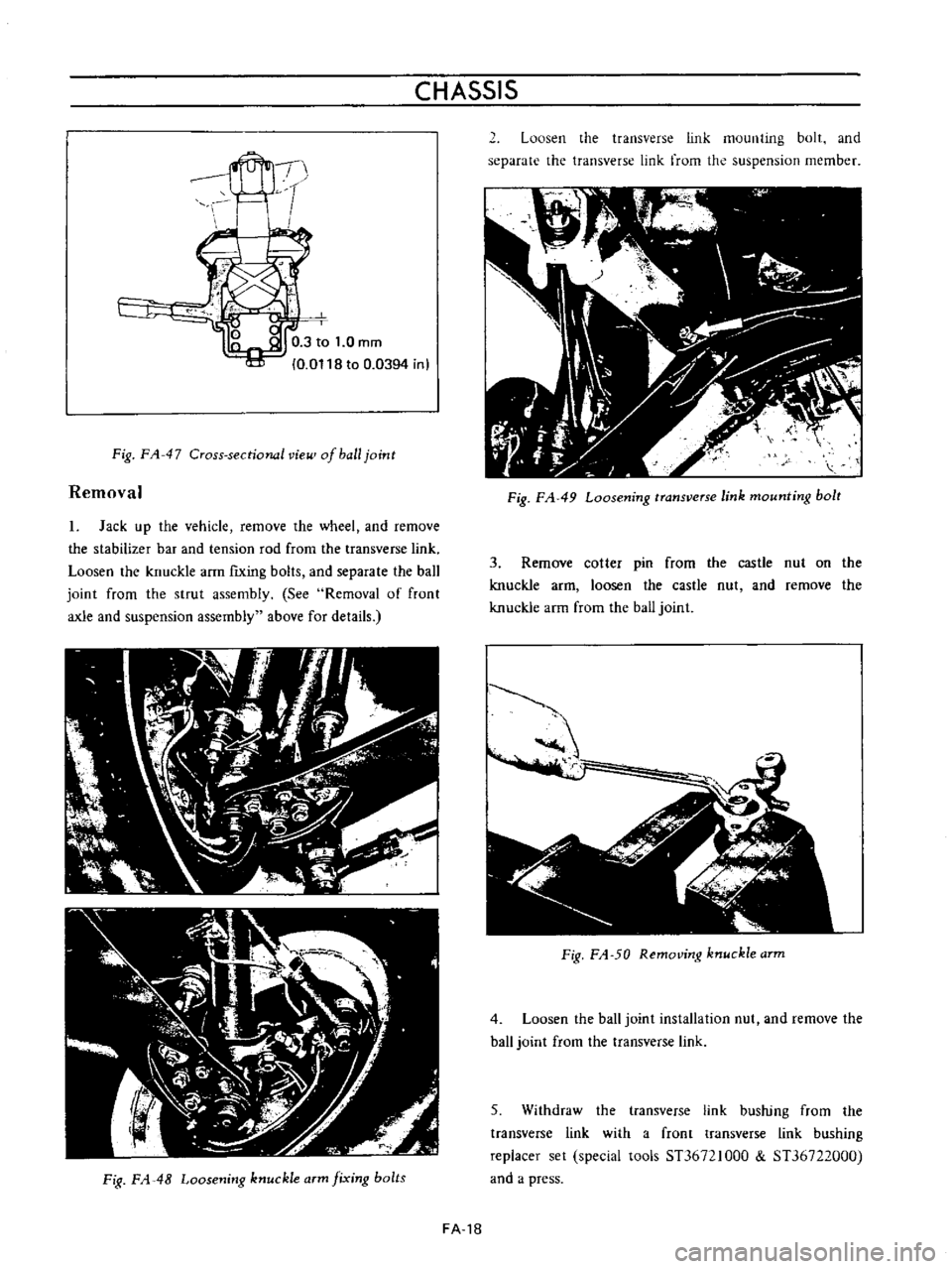
CHASSIS
r
I
El
0
3
to
1
0
mm
0
0118
to
0
0394
in
Fig
FA
47
Cross
sectional
vie
of
ball
joint
Removal
1
Jack
up
the
vehicle
remove
the
wheel
and
remove
the
stabilizer
bar
and
tension
rod
from
the
transverse
link
Loosen
the
knuckle
arm
fiXing
bolts
and
separate
the
ball
joint
from
the
strut
assembly
See
Removal
of
front
axle
and
suspension
assembly
above
for
details
Fig
FA
48
Loosening
knuckle
arm
fixing
bolts
2
Loosen
the
transverse
link
mounting
bolt
and
separate
the
transverse
link
from
the
suspension
member
Fig
FA
49
Loosening
transverse
link
mounting
bolt
3
Remove
cotter
pin
from
the
castle
nut
on
the
knuckle
arm
loosen
the
castle
nut
and
remove
the
knuckle
arm
from
the
ball
joint
J
iIP
A
i
Fig
FA
50
Removing
knuckle
arm
4
Loosen
the
ball
joint
installation
nut
and
remove
the
haJJ
joint
from
the
transverse
Jink
5
Withdraw
the
transverse
link
bushing
from
the
transverse
link
with
a
front
transverse
link
bushing
replacer
set
special
tools
ST36721000
ST36722000
and
a
press
FA
18
Page 105 of 513
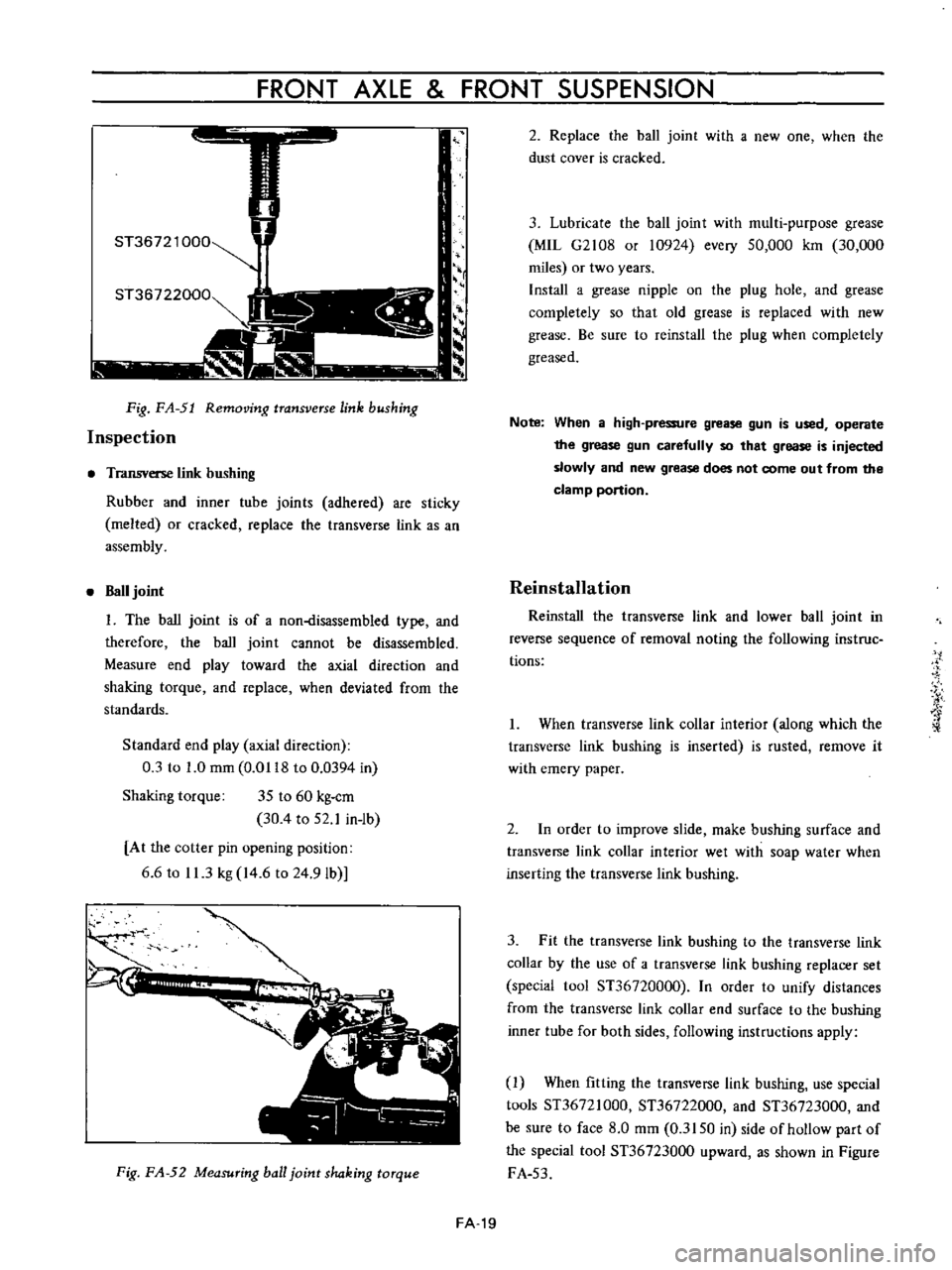
FRONT
AXLE
FRONT
SUSPENSION
I
ST36721
000
ST36722000
Fig
FA
51
Removing
transverse
link
bushing
Inspection
Transverse
link
bushing
Rubber
and
inner
tube
joints
adhered
are
sticky
melted
or
cracked
replace
the
transverse
link
as
an
assembly
Ball
joint
I
The
ball
joint
is
of
a
non
disassembled
type
and
therefore
the
ball
joint
cannot
be
disassembled
Measure
end
play
toward
the
axial
direction
and
shaking
torque
and
replace
when
deviated
from
the
standards
Standard
end
play
axial
direction
0
3
to
1
0
mm
0
0118
to
0
0394
in
Shaking
torque
35
to
60
kg
cm
30
4
to
52
1
in
ib
At
the
cotter
pin
opening
position
6
6
to
11
3
kg
14
6
to
24
9Ib
I
Fig
FA
52
Measuring
ball
joint
shaking
torque
2
Replace
the
ball
joint
with
a
new
one
when
the
dust
cover
is
cracked
3
Lubricate
the
ball
joint
with
multi
purpose
grease
MIL
G2108
or
10924
every
50
000
km
30
000
miles
or
two
years
Install
a
grease
nipple
on
the
plug
hole
and
grease
completely
so
that
old
grease
is
replaced
with
new
grease
Be
sure
to
reinstall
the
plug
when
completely
greased
Note
When
a
high
pressure
grease
gun
is
used
operate
the
grease
gun
carefully
so
that
grease
is
injected
slowly
and
new
grease
does
not
come
out
from
the
clamp
portion
Reinstallation
Reinstall
the
transve
l
e
link
and
lower
ball
joint
in
reverse
sequence
of
removal
noting
the
following
ins
true
tions
I
When
transverse
link
collar
interior
along
which
the
transverse
link
bushing
is
inserted
is
rusted
remove
it
with
emery
paper
2
In
order
to
improve
slide
make
bushing
surface
and
transverse
link
collar
interior
wet
with
soap
water
when
inserting
the
transverse
link
bushing
3
Fit
the
transverse
link
bushing
to
the
transverse
link
collar
by
the
use
of
a
transverse
link
bushing
replacer
set
special
1001
ST36720000
In
order
to
unify
distances
from
the
transverse
link
collar
end
surface
to
the
bushing
inner
tube
for
both
sides
following
instructions
apply
1
When
fitting
the
transve
l
e
link
bushing
use
special
tools
ST36721000
ST36722000
and
ST36723000
and
be
sure
to
face
8
0
mm
0
3150
in
side
of
hollow
part
of
the
special
tool
ST36723000
upward
as
shown
in
Figure
FA
53
FA
19
Page 106 of 513
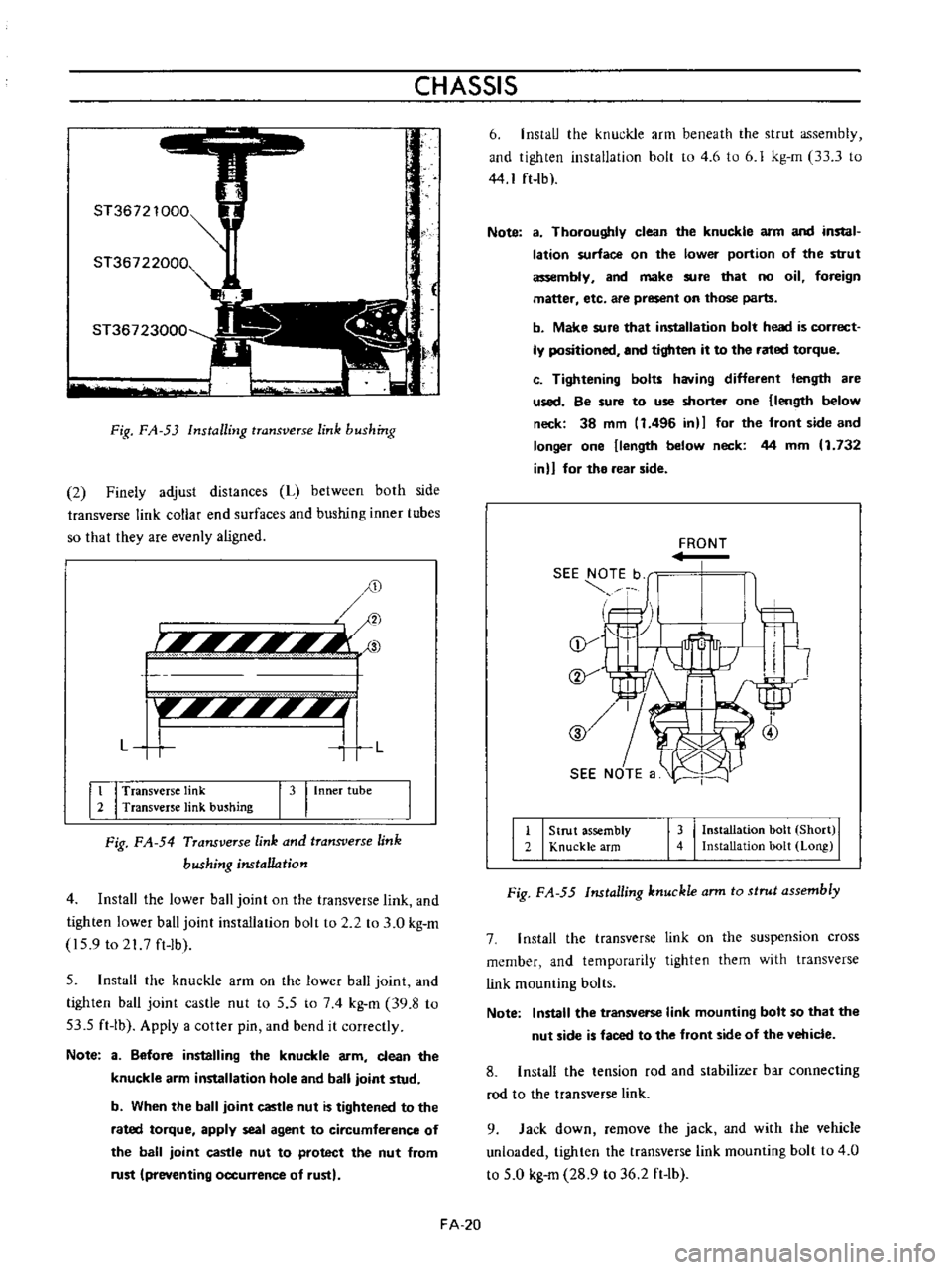
CHASSIS
ST36721000
ST36722000
I
ST36723000
r
Fig
FA
53
Installing
transverse
link
bushing
2
Finely
adjust
distances
L
between
both
side
transverse
link
collar
end
surfaces
and
bushing
inner
tubes
so
that
they
are
evenly
aligned
D
r
Ii
l
Ii
3
F
f
IIII
I
I
L
T
L
It
I
Transverse
link
2
Transverse
link
bushing
I
3
I
Inner
tube
Fig
FA
54
Transverse
link
and
transverse
link
bushing
nstal1o
tion
4
Install
the
lower
ball
joint
on
the
transverse
link
and
tighten
lower
ball
joint
installation
bolt
to
2
2
to
3
0
kg
m
159
to
21
7
ft
Ib
5
Install
the
knuckle
arm
on
the
lower
ball
joint
and
tighten
ball
joint
castle
nut
to
5
5
to
74
kg
m
39
8
to
53
5
ft
Ib
Apply
a
cotter
pin
and
bend
it
correctly
Note
3
Before
installing
the
knuckle
arm
clean
the
knuckle
arm
installation
hole
and
ball
joint
stud
b
When
the
ball
joint
castle
nut
is
tightened
to
the
rated
torque
apply
seal
agent
to
circumference
of
the
ball
joint
castle
nut
to
protect
the
nut
from
rust
preventing
occurrence
of
rust
FA
20
6
InstaIJ
the
knuckle
arm
beneath
the
strut
assembly
and
tighten
instaIJation
bolt
to
4
6
to
6
J
kg
m
33
3
to
44
I
ft
lb
Note
a
Thoroughly
clean
the
knuckle
arm
and
instal
lation
surface
on
the
lower
portion
of
the
strut
assembly
and
make
sure
that
no
oil
foreign
maner
etc
are
present
on
those
parts
b
Make
sure
that
installation
bolt
head
is
correct
ly
positioned
and
tighten
it
to
the
rated
torque
c
Tightening
bolu
having
different
length
are
used
Be
sure
to
use
shorter
one
length
below
neck
38
mm
11496
in
for
the
front
side
and
longer
one
length
below
neck
44
mm
1
132
in
for
the
rear
side
FRONT
II
I
Strut
assembly
2
Knuckle
arm
143
I
Installation
bolt
Short
I
Installation
bolt
Long
Fig
FA
55
Installing
knuckle
ann
to
strut
assembly
7
I
nstall
the
transverse
link
on
the
suspension
cross
member
and
temporarily
tighten
them
with
transverse
link
mounting
bolts
Note
Install
the
transverse
link
mounting
bolt
so
that
the
nut
side
is
faced
to
the
front
side
of
the
vehicle
8
Install
the
tension
rod
and
stabilizer
bar
connecting
rod
to
the
transverse
link
9
Jack
down
remove
the
jack
and
with
the
vehicle
unloaded
tighten
the
transverse
link
mounting
bolt
to
4
0
to
5
0
kg
m
28
9
to
36
2
ft
lb
Page 107 of 513
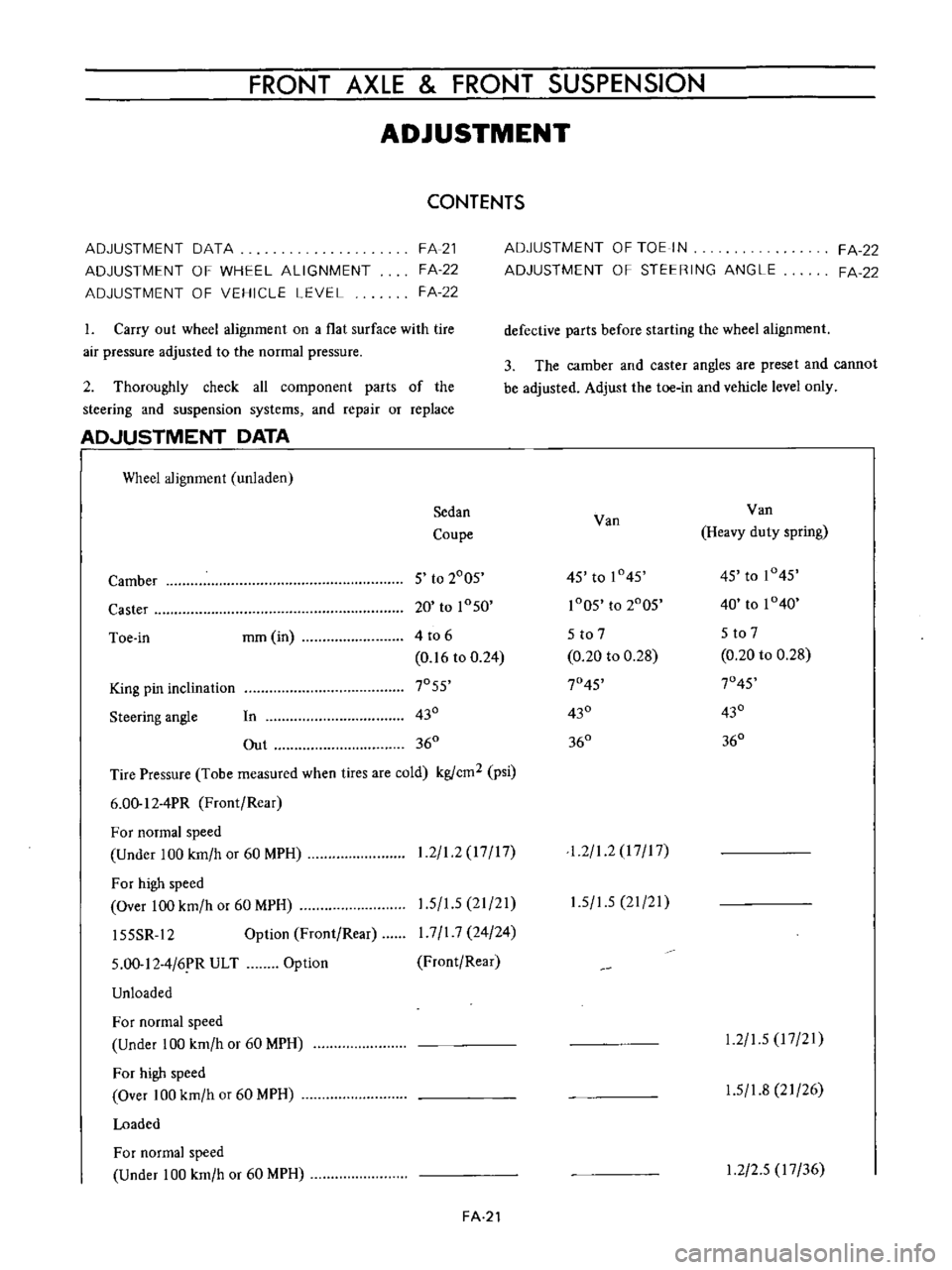
FRONT
AXLE
FRONT
SUSPENSION
ADJUSTMENT
CONTENTS
ADJUSTMENT
DATA
ADJUSTMENT
OF
WHEEL
ALIGNMENT
ADJUSTMENT
OF
VEHICLE
LEVEL
FA
21
FA
22
FA
22
1
Carry
out
wheel
alignment
on
a
flat
surface
with
tire
air
pressure
adjusted
to
the
normal
pressure
2
Thoroughly
check
all
component
parts
of
the
steering
and
suspension
systems
and
repair
or
replace
AD
JUSTMENT
DATA
I
Wheel
alignment
unladen
Sedan
Coupe
Camber
5
to
2005
Caster
20
to
1050
Toe
in
mm
in
4
to
6
0
16
to
0
24
King
pin
inclination
7055
Steering
angle
In
430
Out
360
Tire
Pressure
Tobe
measured
when
tires
are
cold
kgfcm2
psi
6
00
12
4PR
Front
Rear
For
normal
speed
Under
100
km
h
or
60
MPH
For
high
speed
Over
100
km
h
or
60
MPH
15SSR
12
Option
Front
Rear
1
2
1
2
17
17
1
5
1
5
21
21
I
7
I
7
24
24
Front
Rear
5
00
12
4
6
R
ULT
Unloaded
Option
For
normal
speed
Under
100
km
h
or
60
MPH
For
high
speed
Over
100
km
h
or
60
MPH
Loaded
For
normal
speed
Under
100
km
h
or
60
MPH
FA
21
ADJUSTMENT
OF
TOE
IN
ADJUSTMENT
OF
STEERING
ANGLE
FA
22
FA
22
defective
parts
before
starting
the
wheel
alignment
3
The
camber
and
caster
angles
are
preset
and
cannot
be
adjusted
Adjust
the
toe
in
and
vehicle
level
only
Van
Van
Heavy
duty
spring
45
to
1045
45
to
1045
1005
to
2005
40
to
1040
5
to
7
5
to
7
0
20
to
0
28
0
20
to
0
28
7045
7045
430
430
360
360
1
2
1
2
I
7
I
7
1
5
1
5
21
21
1
2
1
5
17
21
1
5
1
8
21
26
1
2
2
5
17
36
Page 108 of 513
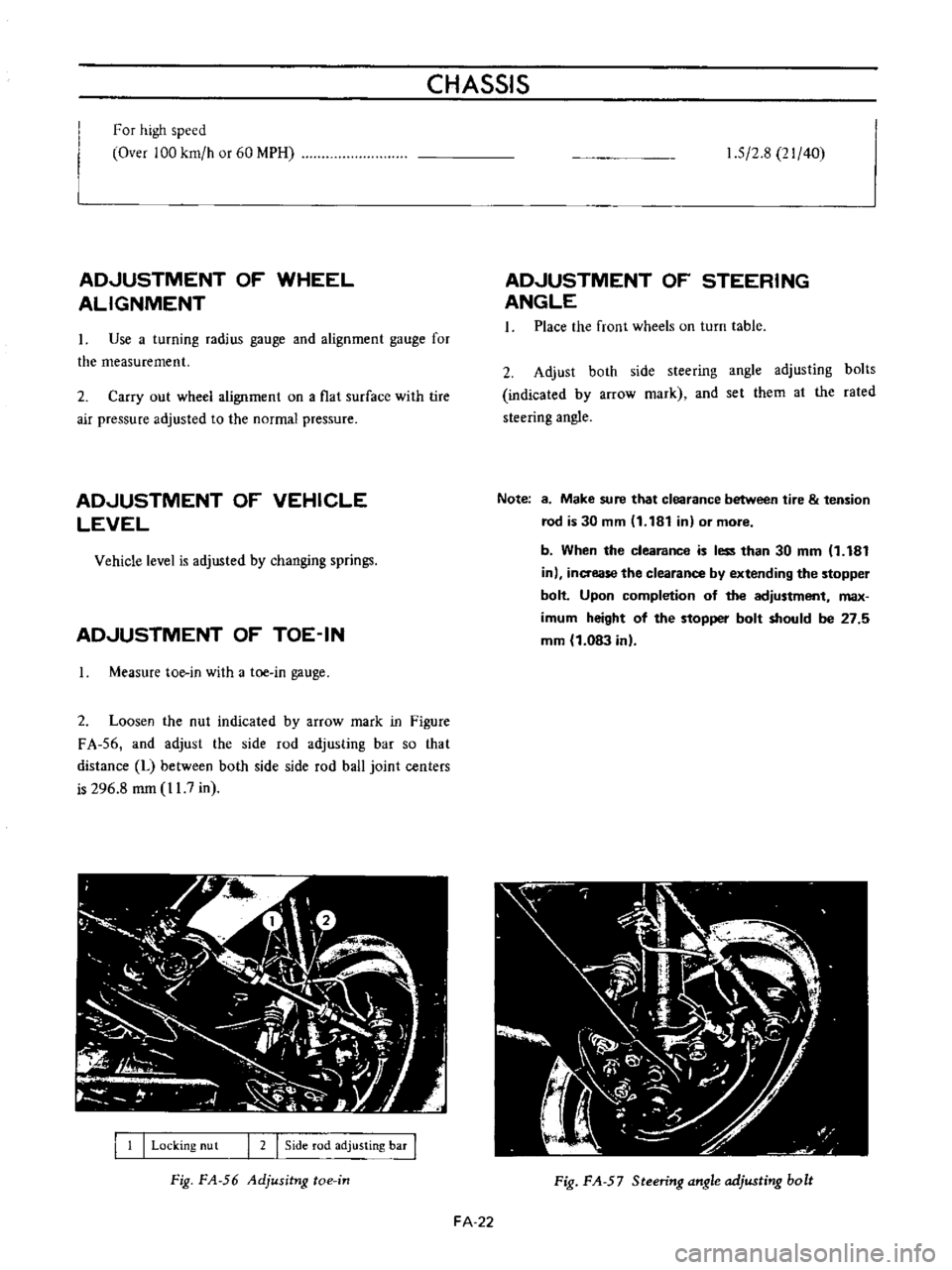
CHASSIS
For
high
speed
Over
100
km
h
or
60
MPH
ADJUSTMENT
OF
WHEEL
ALIGNMENT
Use
a
turning
radius
gauge
and
alignment
gauge
for
the
measurement
2
Carry
out
wheel
alignment
on
a
flat
surface
with
tire
air
pressure
adjusted
to
the
normal
pressure
ADJUSTMENT
OF
VEHICLE
LEVEL
Vehicle
level
is
adjusted
by
changing
springs
ADJUSTMENT
OF
TOE
IN
Measure
toe
in
with
a
toe
in
gauge
2
Loosen
the
nut
indicated
by
arrow
mark
in
Figure
FA
56
and
adjust
the
side
rod
adjusting
bar
so
that
distance
L
between
both
side
side
rod
ball
joint
centers
is
296
8
mm
11
7
in
I
1
I
Locking
nu
t
I
2
I
Side
rod
adjusting
bar
I
Fig
FA
56
Adjusitng
toe
in
1
5
2
8
21
40
ADJUSTMENT
OF
STEERING
ANGLE
1
Place
the
front
wheels
on
turn
table
2
Adjust
both
side
steering
angle
adjusting
bolts
indicated
by
arrow
mark
and
set
them
al
the
rated
steering
angle
Note
8
Make
sure
that
clearance
between
tire
tension
rod
is
30
mm
11
181
in
or
more
b
When
the
clearance
is
less
than
30
mm
1
181
in
inaease
the
clearance
by
extending
the
stopper
bolt
Upon
completion
of
the
adjustment
max
imum
height
of
the
stopper
bolt
should
be
27
5
mm
1
083
in
Fig
FA
57
Steering
angle
adjusting
bolt
FA
22
Page 109 of 513
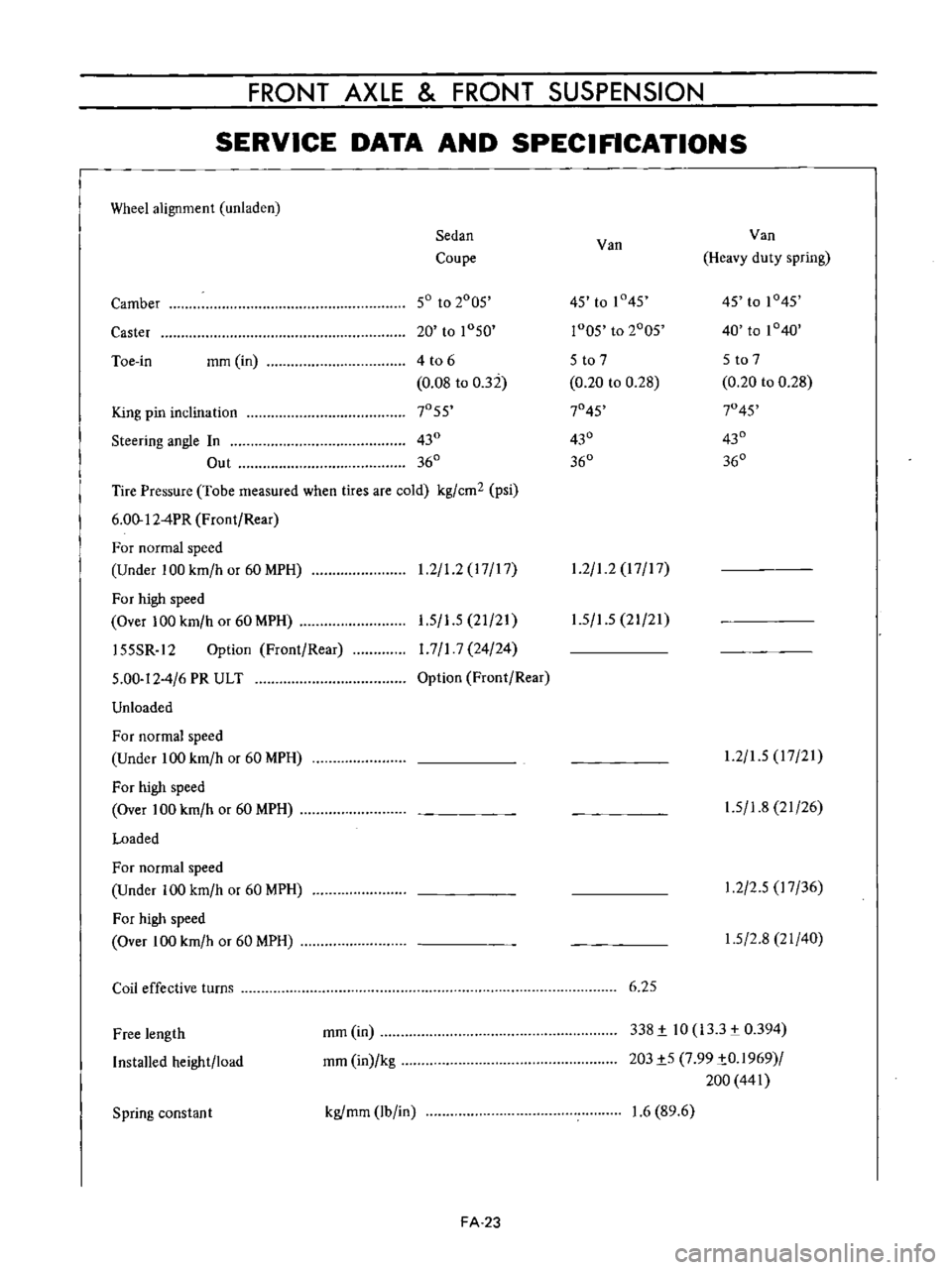
FRONT
AXLE
FRONT
SUSPENSION
SERVICE
DATA
AND
SPECIFICATIONS
Wheel
alignment
unladen
Sedan
Van
Van
Coupe
Heavy
duty
spring
Camber
50
to
2005
45
to
1
45
45
to
1045
Caster
20
to
1050
r005
to
2005
40
to
1040
Toe
in
mm
in
4
t06
5
to
7
5
to
7
0
08
to
032
0
20
to
0
28
0
20
to
0
28
King
pin
inclination
7055
7045
7045
Steering
angle
In
430
430
430
Out
360
360
360
Tire
Pressure
Tobe
measured
when
tires
are
cold
kg
cm2
psi
6
00
12
4PR
Front
Rear
For
normal
speed
Under
100
km
h
or
60
MPH
1
2
1
2
17
17
1
2
1
2
17
17
For
high
speed
Over
100
km
h
or
60
MPH
155SR
12
Option
Front
Rear
5
00
12
4
6
PR
ULT
Unloaded
1
5
1
5
21
21
1
7
1
7
24
24
Option
Front
Rear
1
5
1
5
21
21
For
normal
speed
Under
100
km
h
or
60
MPH
For
high
speed
Over
100
km
h
or
60
MPH
Loaded
1
2
1
5
17
21
1
5
1
8
21
26
For
normal
speed
Under
100
km
h
or
60
MPH
For
high
speed
Over
100
km
h
or
60
MPH
1
2
2
5
17
36
1
5
2
8
21
40
Coil
effective
turns
6
25
Free
length
Installed
height
load
mm
in
mm
in
kg
338
i
10
133
0394
203i5
7
99
iO
1969
200
441
Spring
constan
t
kgfmm
lb
in
1
6
89
6
FA
23
Page 110 of 513
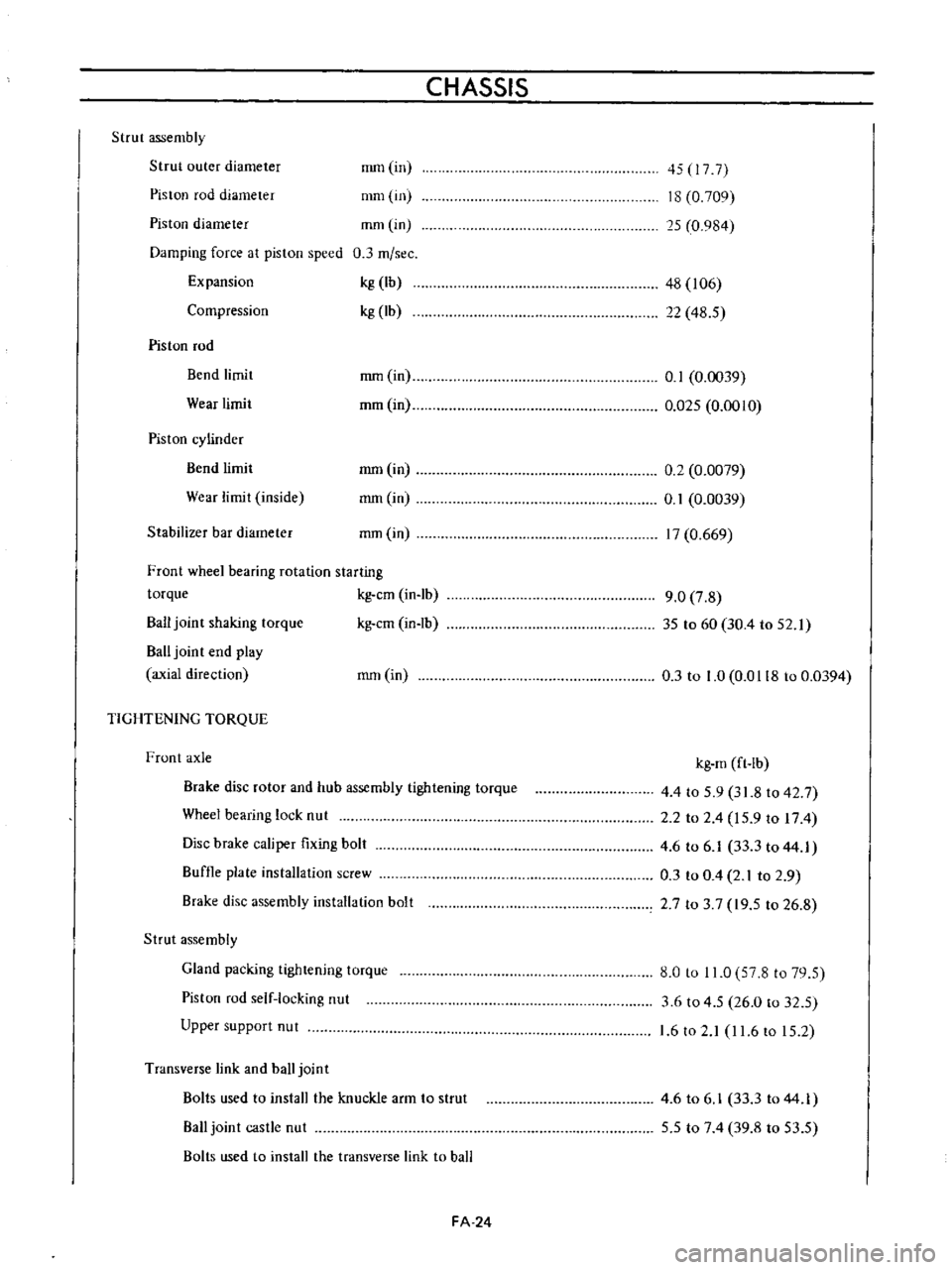
CHASSIS
Strut
assembly
Strut
outer
diameter
Piston
rod
diameter
mmlin
nml
in
45
17
7
18
0
709
15
0
984
Piston
diameter
mmlin
Damping
force
at
piston
speed
0
3
m
sec
Expansion
kg
Ib
Compression
kg
lb
48
106
22
48
5
Piston
rod
Bend
limit
Wear
limit
mm
in
0
1
0
0039
mm
in
0
025
0
0010
Piston
cylinder
Bend
limit
Wear
limit
inside
mm
in
mm
in
0
2
0
0079
0
1
0
0039
17
0
669
Stabilizer
bar
diameter
mm
in
Front
wheel
bearing
rotation
starting
torque
kg
cm
in
lb
Ball
joint
shaking
torque
kg
cm
in
lb
Ball
joint
end
play
axial
direction
mm
in
9
0
7
8
35
to
60
30
4
to
52
1
0
3
to
1
0
0
0118
to
0
0394
TIGHTENING
TORQUE
Front
axle
Brake
disc
rotor
and
hub
assembly
tightening
torque
Wheel
bearing
lock
nut
Disc
brake
caliper
fixing
bolt
Buffle
plate
installation
screw
Brake
disc
assembly
installation
bolt
kg
m
ft
lb
4
4
to
5
9
31
8
to
42
7
2
2
to
2
4
15
9
to
174
4
6
to
6
1
33
3
to
44
1
0
3
to
0
4
2
1
to
2
9
2
7
to
3
7
19
5
to
26
8
Strut
assembly
Gland
packing
tightening
torque
Piston
rod
self
locking
nut
Upper
support
nut
8
0
to
11
0
57
8
to
79
5
3
6
to
4
5
26
0
to
32
5
1
6
to
2
1
I
1
6
to
15
2
Transverse
link
and
ball
joint
Bolts
used
to
install
the
knuckle
arm
to
strut
Ball
joint
castle
nut
Bolts
used
to
install
the
transverse
link
to
ball
4
6
to
6
1
33
3
to
44
1
5
5
to
7
4
39
8
to
53
5
FA
24